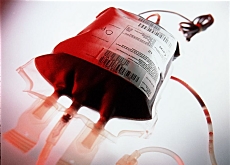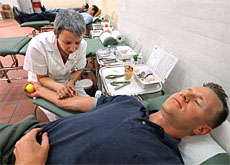Swiss donors give less blood

As many countries mark World Blood Donor Day, a report has revealed that the number of blood donations in Switzerland dropped by eight per cent in 2005.
But the Swiss Red Cross transfusion service, which is based in Bern, said the decline to 372,000 was no real cause for concern.
“We were not surprised,” Rudolf Schwabe, head of the service, told swissinfo, pointing out that the figures published earlier this week were less than one per cent away from its management plan made at the end of 2004.
“First, we always plan our donations according to the need of the hospitals, and the need was down by roughly five per cent. There’s no sense in collecting when there’s no demand for the products.”
Schwabe explained that since blood products only keep for a short time and since demand varies from region to region, instead of trying to get as much blood as possible, authorities now focus on getting the right amount of the right blood type at the right time.
“Second, we had more restrictions [on who could give blood] in the past 18 months due to various diseases worldwide.”
Schwabe denied that bird flu has had a large effect on blood donations but said it might in the future – “we’re currently discussing this issue”.
One of the diseases included in the tightened donation criteria is the West Nile virus found in North America. As a result, anyone returning from Canada or the United States will be unable to give blood for four weeks.
“This means many frequent travellers are banned,” Schwabe admitted. “And in combination with bans on travellers from malaria regions and so on this leads almost to a full life ban for some people.”
Good news
As to why demand for blood products was down, Schwabe said education was possibly having an effect.
“We have a split role as a blood transfusion service. We have to produce the products and sell them to the hospitals. We also give our expertise to the hospitals on how to use blood products – and the less they use the better it is. So maybe our education is slowly coming through.”
More good news was that in 2005 there were no cases in Switzerland of HIV or hepatitis C infections caused by blood transfusions. The last reported case was in 2001.
The emergence of HIV in the 1980s highlighted the importance of ensuring the safety, as well as the adequacy, of national blood supplies.
Healthy donors
Globally however the Geneva-based World Health Organization (WHO) says the shortage of blood is particularly acute in developing countries, where the majority of the world’s population live.
Regular, unpaid voluntary donors are the mainstay of a safe and sustainable blood supply because they are less likely to lie about their health status. The WHO says they are also more likely to keep themselves healthy.
South Africa, for instance, has an HIV prevalence of 23.3 per cent in the adult population but only 0.03 per cent among its regular blood donors.
Despite the drop in Swiss donors, Schwabe said Switzerland is still one of the European countries with the highest number of donations.
“We are fully self-sufficient and we still have a small programme to help other countries,” he added.
swissinfo, Thomas Stephens
Millions of lives are saved each year through blood transfusions. In many countries, however, people still die due to an inadequate supply of blood and blood products.
This has a particular impact on women (as a consequence of pregnancy-related complications), children (malnutrition, malaria and severe life-threatening anaemia), trauma victims and, especially, the poor and disadvantaged.
The Swiss Red Cross transfusion service is an independent company owned by the Red Cross and its 13 regional sections.
The service operates as a non-profit organisation and sells blood products at cost to hospitals.
World Blood Donor Day is being held on June 14 for the third time.
June 14 is the birthday of Karl Landsteiner (1868-1943), an Austrian biologist and physician who in 1901 developed the most important classification of blood groups, the ABO system.
Landsteiner received the Nobel Prize in Physiology or Medicine in 1930 for his work.
81 million donations are made around the world every year – 372,000 in Switzerland. However, only one per cent of the world’s population gives blood.
Normally around half a litre of blood is taken per donation. Humans have around 4-5 litres of blood.

In compliance with the JTI standards
More: SWI swissinfo.ch certified by the Journalism Trust Initiative










You can find an overview of ongoing debates with our journalists here . Please join us!
If you want to start a conversation about a topic raised in this article or want to report factual errors, email us at english@swissinfo.ch.